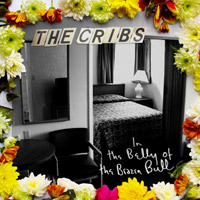
Bloom
Sub Pop
Follow-up records are notoriously tricky, but if your name happens to be Beach House, and you’re trying to match—or even top—a stunning record like Teen Dream, the difficulty of that endeavor increases tenfold. The dreamscape creators du jour, Victoria Legrand and Alex Scally, are trying to live up to that excitement with their fourth full-length, the aptly titled (for the month of May, at least) Bloom.
The tracks on this album are, essentially, one hazy, pastel-colored fairytale after another. Each song feels like its own little reverie, stacked like building blocks on top of one another in some hard-to-discern semblance of order. All are held neatly in place with Victoria Legrand’s sultry, husky croon and Scally’s circuitous, reverb-soaked melodies. It’s hard to top an opener like Teen Dream’s “Zebra,” but “Myth” comes close, with its melodic piano and languid guitars. Then again, the same can be said for every song on this album. “On the Sea” is a light piano jaunt, simplistic and childlike, but the sweet sadness of Legrand’s voice transforms it into a soliloquy of longing. “Lazuli” bursts forth with mournful synths and ghostly vocals.
Still, Bloom is certainly not Beach House’s best effort. That being said... well, that’s really all there is to say. It would be repetitive to delve any deeper, as I’d use the same few adjectives over and over again. (Have I told you it’s “ethereal” yet?) Bloom’s tracks have everything necessary to add up to a great record, but it’s so formulaic that the point never comes to fruition; the songs simply melt into one another without pause. Yes, Bloom is breezy and light, and it makes you feel something. But what that something is is never quite realized.
Jennifer Farmer

In the Belly of the Brazen Bull
Wichita
In the tangled web of society’s current obsession with social networking, who you know is no doubt of great importance. But in the case of Gary, Ryan and Ross Jarman, the three brothers who make up British band The Cribs, their network may have become a bit of curse.
Having achieved moderate success after six years and three albums on their own, they were joined by Johnny Marr in 2008, just in time to record their fourth record, Ignore the Ignorant, which ended up cracking the UK Top 10 and catching the attention of American listeners. For all the notoriety that the former Smiths guitarist brought the band, though, his presence also effectively erased The Cribs’ previous achievements. Now, with Marr having left the fold as quickly as he entered it, the band is back to square one, attempting to re-establish its own identity.
The band seemingly has a good Rolodex when it comes to producers as well. While in the past the trio has worked with luminaries like Edwyn Collins, this time they chose to record with Dave Fridmann at his Tarbox Road studio, as well as, to a lesser extent, with Steve Albini at his Electrical Audio studio. Fridmann’s penchant for saturated recordings, though, didn’t do the band any favors. While In the Belly of the Brazen Bull is immediately recognizable as the producer’s work it is to The Cribs’ detriment. The drums on “Anna” sound horrible, as if they are coming through a blown woofer, while the acoustic “I Should Have Helped” has been ridiculously pushed into the red. Albini’s work on “Chi-Town,” for example, is better, if only because it is more natural. The band would have been better off seeking out an engineer more sympathetic to their sound, like Bruce Vig or Jack Endino, an especially natural choice given that he lives in Seattle and Ryan Jarman now lives is Portland. One is tempted to put the treatment down to style over substance, only one can clearly hear that there is plenty of substance. The problem is that The Cribs allowed Fridmann to put his stamp on the record, and as such, their identity still remains problematically fuzzy.
Stephen Slaybaugh
MP3: “Chi-Town”

Not Your Kind of People
Stunvolume
Garbage is a distinctly ’90s creation. It’s not just that Nevermind-producer Butch Vig is a member of the band or that singer Shirley Manson was discovered by Vig, guitarist Steve Marker and bassist Duke Erikson while watching 120 Minutes. Their blend of rock and electronica was the kind of weird juxtaposition that made sense at the time. Garbage was the right band at the right moment and carried on for four albums before announcing an “indefinite hiatus.” In most occasions, that’s just a polite way to break up, but seven years after their last record the band is back with Not Your Kind of People, their first for their own label.
Garbage was always an interesting beast, if for no other reason than there was always a bunch of moving parts. And there was the world-conquering swagger of Manson, which she balanced with unblinking vulnerability. Such contradictions were wrapped in full-tilt studio experimentation, so what held it together were the songs at the heart of it all. Thankfully such songwriting is present on Not Your Kind of People. Songs like “Big Bright World” and “Control” harken back to their self-titled debut, and as everyone would expect, it’s a great sounding record.
But what makes Not Your Kind of People worth the time is the same qualities that have made Garbage interesting: the way Manson balances between dark and light and the way the boys in the band have her back at every step. It’s the type of record that succeeds at such a high level it makes revisiting the back catalog inevitable. It also shows the wisdom of ignoring any pressure to follow current trends. Even with seven years off, Garbage has thankfully stayed Garbage.
Dorian S. Ham

We Rose from Your Bed With the Sun in Our Head
Young God
With live records, there’s never a happy medium. A live record seems to be only able to go to one extreme or the other as far as quality. But We Rose from Your Bed With the Sun in Our Head, Swans’ double-live CD originally released in a handmade edition of 1,000, is definitely, positively not like any live record to have come before it.
On studio recordings, Swans possess the looming power of sonic masters, forcing the listener into a voluntary submissive state as each song progresses. Live, Swans exhibit an aggressive sincerity—whether obliviously happy or indulging a jaded, misanthropic bent—that is devoid of the irony plaguing much modern music. As such, there is no casual Swans listener; either you accept the bludgeoning or you skip away unscathed.
Michael Gira seems to acknowledge this sentiment in publicized notes to his fans. There are exclaimed “thank you’s” and blessings abound to all of those involved. There are explanations of the sonic vivification he seeks to achieve, as well as a hope that these live recordings will grant the listener a “positive experience of some sort.” Perhaps Gira himself exists in the extremity of how his music affects fans. Maybe that sonic hammering Gira and company (Gira being the only remaining original member) dole out is meant as a secured dosage, the end of which will bring about the cure and the positive experience he wishes for us. All I know is that if I open my eyes in the middle of this version of “Eden Prison,” I will find myself a drooling, twitching mess. But if I manage to keep them closed until the last snapped word comes of Gira’s mouth, everything will be okay and resolved with the universe. This must be the positive experience he’s talking about. Seeing this happen live was surely a visceral experience, but being able to take it and put it through your own private speakers makes for a personal, holy event thankfully devoid of bathroom and bar lines. We Rose gives both a glimpse of the current permutation of Swans (“No Words, No Thoughts,” “Jim,” “Eden Prison”), and a new insight into the older work (“Sex, God, Sex” and “Beautiful Child” from 1987’s Children of God), with a band that can rain hellfire upon a crowd and still maintain the warmth of the original work. So while this is far from the whole picture of what Swans are live, it is as nice a glimpse as you are going to get.
Michael O’Shaughnessy

Avengers Assemble: Music from and Inspired by the Motion Picture
Hollywood
There was a time when comic book films were a niche industry, and something like The Crow or Tim Burton’s Batman was a showcase for some surprisingly weird stuff. In the 21st century, though, The Avengers is the biggest movie ever, and the soundtrack, while strangely named differently, gathers a bunch of songs ambitiously anthemic enough to suit the clash of the champions on the screen.
On an album that includes post-grunge wannabes like Bush, Buckcherry and Papa Roach, the reunited Soundgarden is the marquee name. Unfortunately, “Live to Rise” is not exactly a satisfying event. The song does start with an encouraging Kim Thayil riff, but Chris Cornell’s ultra-masculine octaves are only about half-present, and it doesn’t take long for an adult-contemporary flavor evocative of Cornell’s solo efforts to drag the song down. Only in the instrumental sections does the song show any of the frenetic energy we expect from the group. When the guitar takes over, you can almost hear Kim shouting “c’mon c’mon c’mon” before it’s time for a verse and Cornell’s saying, “Let’s smooth it out.” Ugh.
By comparison, the anthemic efforts on the rest of the album are positively heroic. Shinedown captures the urgency of the movie in “I’m Alive,” and on “Dirt and Roses,” Rise Against are as defiant as Captain America in the face of an alien invasion. However, Scott Weiland seems to have been reborn as an emo kid, and he battles with Redlight King to see whose track can be the most ridiculously awful. In the second half of the album, there’s a lot of offensively boring stuff. Evanescence is angstful like that half-hour in the middle of the movie with tons of talking and no action. Pusherjones is a truly bizarre mash-up of styles, as if New Found Glory were big fans of early Poison. And then you get to hear Five Finger Death Punch remove all traces of subtlety from a great Faith No More song.
I’ve got to say Black Veil Brides’ “Unbroken” would have been way more appropriate to play over the movie’s end credits than Soundgarden’s effort. Its ’80s metal sound (think Winger) and its chorus (“If we stand together, we will be unbroken.”) fit just right with the comics-come-to-life vibe of the movie. I guess the other songs do too, it’s just a shame so many of them don’t live up to their epic attempts.
Matt Slaybaugh
ALBUM REVIEWS
Cheap Time, Wallpaper Music
Damon Albarn, Dr Dee
Here We Go Magic, A Different Ship
Royal Headache, Royal Headache
Santigold, Master of My Make-Believe
Death Grips, The Money Store
Brian Jonestown Massacre, Aufheben
Little Hurricane, Homewrecker
Ty Segall and White Fence, Hair
Mad Scene, Blip
Battles, Dross Glop
Sidi Touré, Koima
Screaming Females, Ugly
Lioness, The Golden Killer
